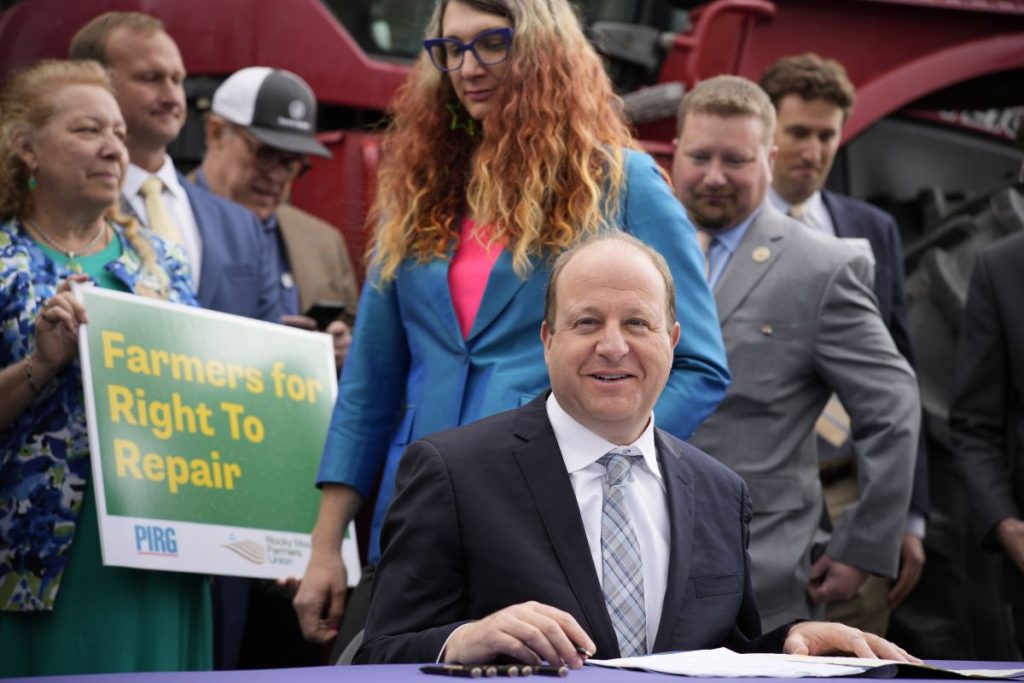Colorado becomes 1st to pass ‘right to repair’ for farmers
By JESSE BEDAYN Associated Press/Report for America
DENVER (AP) — Sitting in front of a hulking red tractor, Democratic Gov. Jared Polis signed a bill Tuesday making Colorado the first state to ensure farmers can fix their own tractors and combines with a “right to repair” law — which compels manufacturers to provide the necessary manuals, tools, parts and software.
Colorado, home to high desert ranches and sweeping farms on the low-and-level plains, took the lead on the issue following a nationwide outcry from farmers that manufacturers blocked them from making fixes and forced them to wait precious days for an official servicer to arrive — delays that imperiled profits.
While their increasingly high-tech tractors or combines sit impotent, a hailstorm could decimate a crop or a farmer could miss the ideal planting window, farmers said.
“Farmers have had to wait three or four weeks to get repairs done to equipment when they can do repairs themselves. That’s just unfathomable,” said Bill Midcap, whose son is a fifth-generation rancher on Colorado’s eastern plains.
Lawmakers in at least 10 other states have introduced similar legislation, including in Florida, Maryland, Missouri, New Jersey, Texas and Vermont.
Colorado has taken the lead, but Democratic Rep. Brianna Titone, the bill’s sponsor, and Dan Waldvogle, director of the Rocky Mountain Farmers Union, said it’s a potential launch pad for other states and even at the federal level where discussions about similar legislation are already underway.
The legislation advanced through long committee hearings, having been propelled forward mostly by Democrats even though a Republican lawmaker co-sponsored the bill. The proposal left some GOP lawmakers stuck between their farming constituents pleading for the ability to repair their equipment and the manufacturers who vehemently opposed it.
Manufacturers and dealerships raised concerns that providing tools and information to farmers would allow equipment owners to illegally crank up the horsepower and bypass emissions controls — putting operator safety and the environment at risk.
Opponents also worried that compelling companies to share more detailed information necessary for repairs could expose proprietary information.
“Forcing a business to disclose trade secrets, software and jeopardize consumer safety is poor public policy,” said Republican state Rep. Matt Soper, adding that it will stifle tech innovation.
Manufacturer John Deere did not immediately respond to a request for comment.
At the signing ceremony Tuesday afternoon, under a light drizzle of rain, Polis said: “This bill will save farmers and ranchers time and money and support the free market in repair” before exclaiming, “first in the nation!”
Behind the governor and arrayed farmers and lawmakers sat a red Steiger 370 tractor owned by a farmer named Danny Wood. Wood’s tractor has flown an American flag reading “Farmers First,” and it been one of two of his machines to break down, requiring long waits before servicers arrived to enter a few lines of computer code or make a fix Wood could have made himself.
Polis and Titone climbed inside the tractor for a photo as the ceremony ended.
The bill’s proponents acknowledged that the legislation could make it easier for operators to modify horsepower and emissions controls. But they argued that farmers are already able to tinker with their machines, and doing so would remain illegal.
The law falls into the broader “right to repair” campaign, which has picked up steam across the country and applies to a range of products, from iPhones to hospital ventilators. Independent mechanics and car owners have access to tools and parts because of a 2014 memorandum of understanding signed by the automotive industry.
Two years ago, President Joe Biden directed the Federal Trade Commission to beef up its right-to-repair enforcement.
____
Bedayn is a corps member for the Associated Press/Report for America Statehouse News Initiative. Report for America is a nonprofit national service program that places journalists in local newsrooms to report on undercovered issues.
Trending News:
Cody Broncs Chase Hatch Signs With Boise State For Football
|
Cody Fillies Swimming And Diving Have All-Time Season
|
The Cody Fillies Basketball Team Begin New Era
|
Cody Broncs Basketball Prepare For New Season In 3A
|
Cody Broncs Football In A Close One
|
Wrap-Up Of The Cody Fillies Volleyball Season
|










